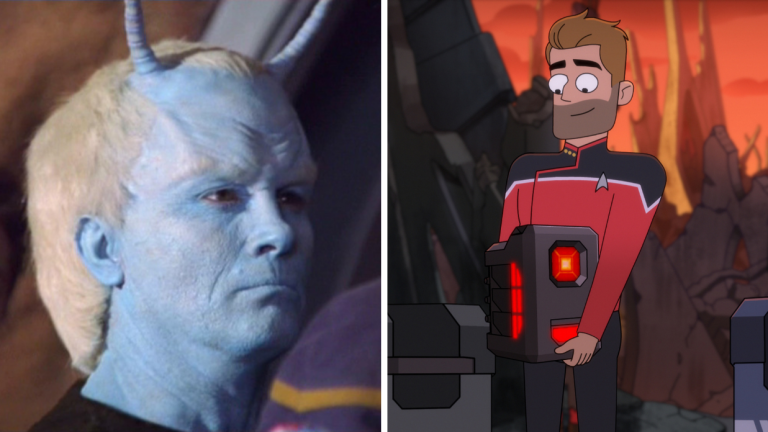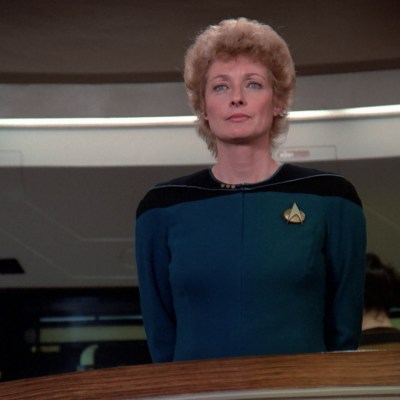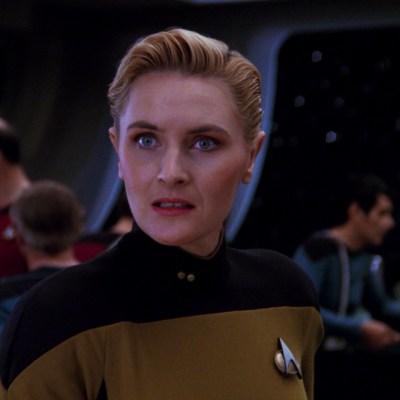Star Trek’s Jeffrey Combs On Why Enterprise Deserves More Love
Jeffrey Combs, the man behind Shran, Weyoun, and several other Star Trek favorites, is back as an evil computer on Lower Decks.

Mild spoilers ahead for Star Trek: Lower Decks Season 2, Episode 7, “Where Pleasant Fountains Lie.”
Jeffrey Combs is Star Trek royalty. There’s just no other way to say it. Prior to 2021, Combs played eight distinct characters across three different series. But now, after his turn in the latest Star Trek: Lower Decks episode — “Where Pleasant Fountains Lie” — Combs has now played nine characters across four shows. If you loved Combs as Shran in Enterprise or Weyoun in DS9, you’re gonna love him as the voice of an evil and hilarious A.I. in Lower Decks. Den of Geek had a chance to chat with Combs about returning to the Trek universe, why he’s glad he didn’t get the role of Will Riker in 1987, and his firm belief that the prequel series Enterprise contains some of the best of Trek ever.
In the latest episode of Lower Decks, Boimler and Mariner have to transport a rogue A.I. via shuttlecraft, to a secret Starfleet storage facility where, apparently, little evil computers are all stored. The twist is, that along the way, their shuttle crashes on an inhospitable planet — very reminiscent of Ceti Alpha V from The Wrath of Khan — leaving Boimler and Mariner stuck with the evil computer, who is trying to get in their head.
“I’m constantly just trying to get someone to plug me in,” Combs explains. “I cajole. I threaten. I charm. Just help me get off this planet! I’m the solution! It’s just a delicious note to play. I just keep trying to get them to do it. Then I can take over the multiverse.”
Before playing the voice of this little evil computer, It’s been a while since we’ve heard from Jeffrey Combs in the Trek universe. His last appearance was in the Enterprise season finale in 2005, playing the cranky Andorian Shran, a role which Discovery’s most recent Andorian, Noah Averbach-Katz, said was his “template for the Über-Andorian.” Depending on your favorite era of Trek, you might have a different image of Combs in your mind. In Deep Space Nine, although he played the Ferengi Brunt his most affecting role was probably Weyoun, the duplicitous and scheming Vorta clone.
“With Weayoun, everyone was a snarling gravelly-voiced villain,” Combs says. “And I thought: ‘hmm maybe I do something different and play a different note.’ I always try and find that. It’s not always there. Shran was a little more of a serious take. But even he can get a dark joke in there, every once in a while.”
When asked, Combs jumped at the chance to do Lower Decks, saying “After I hear the word ‘Star’ followed by the word ‘Trek,’ I’m completely enamored of the idea and eager to be a part of it.” That said, Combs admits that the tone of Lower Decks was, at first, tricky.
“My biggest challenge was meeting the tone of the script,” he says. “I hadn’t seen much of Lower Decks, so, at first, I didn’t have much of a frame of reference. It was a completely different kind of tone from what I’m used to with Star Treks. It’s a little sassy. A little irreverent. But it does have some honesty about it and some issues that people are dealing with. But I just kind of like the fast-paced sort of wry humor that’s mixed in. I think I hit their music. I tried to keep up with the very talented pack of actors.”
In 1986, when Lower Decks actors Tawny Newsome and Jack Quaid were still young kids, Jeffrey Combs was in a “crowded room,” waiting to audition for the role of Commander Will Riker in Star Trek: The Next Generation. Combs laughs off the memory, saying “Everybody auditioned for Riker. It was a cattle call. It was a room with a ton of guys and in a corner, in this big room, they would call you up and you’d read for 20 seconds. When my agent called me with an audition for a new Star Trek series and described the role, I said, ‘I am not right for that role. There must be something else in there I can do.’ It was described as a tall, leading man — hey hello! So I showed up in my cowboy boots, trying to get as much height as I could. Futile. I have to say… they chose the right person: Mr Frakes!”
Of course, Combs reunited with Jonathan Frakes several times throughout his various appearances on Star Trek, starting with the DS9 episode, “Meridian,” which was directed by Frakes. And of course, Combs appeared onscreen with Frakes in the Enterprise series finale, “These Are the Voyages…” These days, the most misunderstood Trek series of them all is having something of a renaissance. 2021 marks the 20th anniversary of the debut of Enterprise, reasserting the enduring power of the series that was supposedly the one that fans liked the least. When I ask Combs what he thinks of the newfound adoration of Enterprise, his love of the series is unequivocal.
“Well, it should be praised. People were ambivalent about it at first. I really don’t know why. Let’s not forget The Original Series was canceled after three seasons,” Combs says. “I feel like Enterprise’s sea legs, and its voice, were just starting to happen when it was canceled. It did hit its stride in that last season. And I think the same thing can be said for DS9, Voyager, and maybe Next Generation. These things take some time to find their music. They pulled the trigger too fast. I feel strongly about this.”
The notion of a fifth season of Enterprise in the year 2006, would have certainly created an alternate universe of Trek production history. Had Enterprise lasted seven seasons, like its three predecessors, it would have gone off the air in 2008 or 2009, which certainly changes the trajectory of the reboot films. It’s a tough world to imagine, but if you love Star Trek, Combs does have a point. The third and fourth seasons of Enterprise are utterly re-watchable, and some of the episodes in those seasons, like “Demons” and “Terra Prime,” represent just how powerful and intelligent Star Trek can be.
“I think it holds up quite nicely,” affirms Combs. “There’s no marked difference in any of them, and in fact, some of the best episodes of Star Trek are on Enterprise.”


